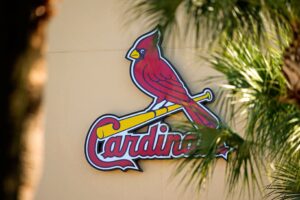In Brett Baty’s junior year at Lake Travis High School in Austin, Texas, the third baseman hit .435 with 12 home runs in 85 at-bats. He committed to play college baseball at the University of Texas, 18 miles away from his hometown. Already turning 19, he had an advantage over players that were naturally less developed in high school. The future looked bright, and then he began his senior year.
Becoming a First Rounder
In 98 at-bats during the 2019 senior season, Baty hit .602 with 19 home runs and 50 RBIs. Approximately one-third of his hits didn’t require him to run the bases, and with that in mind, his professional baseball dreams changed. His scouting report already stood out because he was a left-handed batter at a right-handed infield position. Before his senior year, it may have been a question of what round he would go in. All of a sudden, it was a matter of finding out which team would take him in the first round. Earning the honor as Texas’ Gatorade Player of the Year only solidified his position as a pro-caliber prospect.
After months of speculation, the New York Mets eventually selected Baty with the 12th overall pick in the 2019 Draft. He inked a $3.9 million signing bonus, and within two months, he went from varsity to professional baseball. He flew through the early levels of the farm system, moving quickly from the Gulf Coast League to Kingsport, where he played most of the season before finishing up with the Brooklyn Cyclones in Single-A ball.
Trouble in Rookie Ball
Despite progressing through three teams in one summer, Baty didn’t perform as well as some may have expected. Beyond the Gulf Coast League, he struggled at the plate against tougher pitching, batting .234 over the course of all three stints. He didn’t lose his power, as 25 of his 44 hits were for extra bases, but he simply appears to have been overwhelmed.
This regression is understandable, as he was brought along much quicker than other prospects. He performed well with the GCL Mets, the league he was initially assigned to, hitting .350 in 35 plate appearances. From there, high expectations propelled him forward in an effort by management to give him experience against tougher pitching. He didn’t respond in that initial test, but he has plenty of time to acclimate.
What’s clear is that the Mets have high hopes for Baty. For a team that often develops players gradually, two early promotions in a two-month stretch is a telling sign of the Mets trust in him and his All-Star potential. At this point, they’ll likely slow him down and allow him to adjust to Single-A ball.
Bottom Line
Baty is a capable fielder that will have to adjust to better pitching, but his left-handed hitting mechanics geared toward his power will always make him dangerous at the plate. It will become increasingly apparent in future seasons whether he can compete at this level of baseball, but that answer will only come with time. Based on his current trajectory, he will likely make his way through the Mets’ farm system by 2022. What follows from there is uncertain for this very highly touted farmhand.
Main Image
Embed from Getty Images






